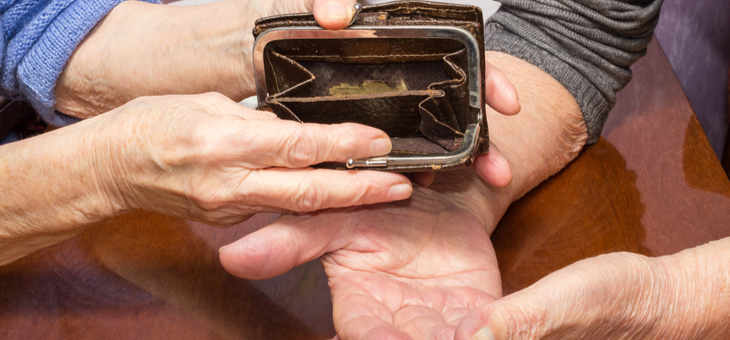Age pensioners looking forward to the usual 20 September pension increase could be in for a shock, as the Combined Pensioners and Superannuants Association (CPSA) claims there will be no increase to the Age Pension at the next indexation.
This will mark the first time since 1931 that there will be no pension increase, says CPSA.
“Eighty-nine years ago, on 23 July 1931, the Age Pension was reduced from $104 to $91 a year as Australia tried to cope with what would go down in history as the Great Depression,” said CPSA in a statement.
“On 13 October of that year, the annual pension amount was again reduced, this time to $78.
“CPSA was founded in 1931 to fight those pension reductions.”
Since 1931, the Age Pension has been increased every time it was indexed. Pensions are indexed twice a year – on 20 March and 20 September – on the basis of inflation and wages.
While it is almost impossible for the pension to be reduced, it can stay the same.
And according to the CPSA, the pension is not going up at the next pension indexation.
That may mean the current payment rates will remain at $944.30 for singles and $1423.60 for couples combined per fortnight.
While the 20 September rates have not yet been made official, the CPSA believes a simple calculation shows that they will not change.
“The basis for indexation on 20 September will be the Pensioner Beneficiary Cost of Living Index (PBLCI), which is a special inflation rate for pensioners,” says CPSA.
“The PBLCI went up more than the Consumer Price Index (CPI). However, the PBLCI for the June 2020 quarter and the December 2019 quarter are the same: 115.7.
“The Pension Supplement is always indexed according to the CPI, while the Energy Supplement does not get indexed at all. So, both the Pension Supplement and the Energy Supplement stay the same as well.
“All this means that for the first time since 13 October 1931 the overall pension will not be increased.
“The average weekly wage, which is the third indexation option, is not much use these days. By law the single pension must at least be 25 per cent of the average weekly wage, which stands at $1498.20. This means that the average weekly wage must go up by $236.40 to $1734.60 before it becomes relevant to pension indexation again. This might take a while.
“The basic pension at the moment is 27.5 per cent of the average wage.”
The governor of the Reserve Bank of Australia, Philip Lowe, has already stated that the CPI should start to pick up during the September 2020 quarter, which means the Age Pension should also rise at the next indexation on 20 March 2021.
But that may provide little solace for pensioners doing it tough in the midst of a pandemic, including singles with the pension as their sole source of income.
“A lot of people will be quite upset about not getting an increase on 20 September. In the lead-up to any pension indexation in March and September, we get a lot of calls from single full rate pensioners keen to know how much the increase will be,” CPSA policy manager Paul Versteege told YourLifeChoices.
“It has been slim pickings for them for a number of years. Make no mistake, the majority of single full rate pensioners are widows and widowers. Their income dropped 40 per cent when their partner died. Pension poverty continues to be real.”
A spokesperson for Department of Social Services told YourLifeChoices: “No determination has been made for the September indexation.”
Are you surprised that there may be no pension increase on 20 September?
If you enjoy our content, don’t keep it to yourself. Share our free eNews with your friends and encourage them to sign up.
Related articles:
https://www.yourlifechoices.com.au/age-pension/news/age-pension-not-liveable
https://www.yourlifechoices.com.au/age-pension/news/age-pension-generous-minister
https://www.yourlifechoices.com.au/news/age-pension-under-pressure

